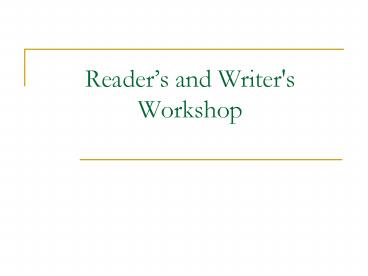Readers and Writer's Workshop - PowerPoint PPT Presentation
1 / 18
Title:
Readers and Writer's Workshop
Description:
Reader's and Writer's Workshop is designed to help students develop skills and ... those skills and strategies eventually become instinctive, innate, and their own. ... – PowerPoint PPT presentation
Number of Views:173
Avg rating:3.0/5.0
Title: Readers and Writer's Workshop
1
Readers and Writer's Workshop
2
Readers and Writer's Workshop is designed to
help students develop skills and strategies that
will be used in their future writing projects
and in future reading .and in their
future.There is a gradual build of skills and
strategies and then forced implementation. For
the students, those skills and strategies
eventually become instinctive, innate, and their
own.
3
http//www.teachersfirst.com/lessons/writers/write
r-4.html
- Writers Workshop
4
Mini-Lesson
- A Mini- Lesson is usually a 5-10 minute whole
class activity and may be as simple as doing
guided writing from a story, or how revision
codes are used. - Useful mini-lessons for the Upper Grades are
- story mapping
- having an adult guest writer, or yourself, model
the process of revision - modeling note taking for gathering information
- modeling the strategy on the overhead
- reading from a touchstone text to model the
strategy
5
Practice
- In their writing, students are to integrate the
mini-lesson skill. - Their writing should also have evidence of
previous mini-lesson writing strategies.
6
Status of the Class
- The Status of the Class takes about 2-3 minutes
and provides the student and teacher with
information about how the student's work is
progressing. - In the Upper Elementary grade classrooms it can
be done quickest by having students write their
name on the board under the appropriate category - Conferencing
- First Draft
- Work in progress
- Revision
- Illustrating
- Final Editing
- Publishing
7
http//faculty.uoit.ca/hughes/Writing/TheWritingPr
ocess.gif
8
Write and Confer
Mini-Lesson A Mini- Lesson is usually a 5-10
minute whole class activity and may be as simple
as doing guided writing from a story, or how
revision codes are used. An example is to lay out
a favorite story's events in beginning, middle,
and end form, create an idea web featuring a
book's plot, or formally present the use of '
mechanics' such as more complicated grammar parts
and punctuation. Modeling good interviewing
techniques is still appropriate because students
will need to use them in
- Writing Conferring is ideally a 20 - 40 minute
session. Brainstorming sessions may still be the
best way to come up with topics and ideas, and
peer conferencing is still useful to the student.
- Editing is not the focus of the teacher
conference, expanding ideas and trying to find a
'voice' for the student writer is. Revisions can
then take place. - The editing phase focuses on mechanics and any
additional revisions to be made. In the Final
Draft, teachers should expect correct use of
basic grammar, spelling and punctuation with
guidance. - For Peer Editing, TAG can be used.
- Tell one thing you liked about the story
- Ask one question
- Give one suggestion.
- (Upper Elementary students may want to share a
'Work in Progress' or 'Revision' to get many
different opinions for inspiration.)
9
Sharing Author's Chair
- Sharing and Author's Chair usually take 10
minutes and be done either by having the students
- read to the class a 'published book
- by children sharing their work in pairs
- by allowing students to read published works to
themselves. - Peer Sharing or allowing students to read
classmates works individually and write TAG
comments may be preferred by Upper Grade
Elementary students. - Student Assessment is done by keeping a portfolio
of revisions and copies of completed work.
10
Readers Workshop
11
The Readers Workshop Mini-Lesson
- Readers Workshop starts with a mini-lesson that
is based on a reading strategy. - The mini-lesson must be short, concise, and
focused and begins with a connection. - The teacher models the strategy through reading,
using a mentor text. - The students take part in practicing the
strategy through a simple activity. - Students then read independently, either using an
assigned novel or a self-selected piece,
practicing the strategy for immediate
implementation. - The workshop can then proceed with the weeks
activities that include a variety of learning
opportunities, many of which are based on the
mini-lesson strategy, including teacher
conferencing. The teacher conference, in small
groups, allows the teacher to get a better
perspective on how well the students are grasping
the strategy and allows students to ask questions
and share responses in a less threatening
environment. The students can then rotate through
the activities daily. Students can also work
independently to implement the strategy, using
the traditional elementary model.
12
Readers Workshop
13
(No Transcript)
14
(No Transcript)
15
Flexible Grouping
Readers Workshop groups may transform..
Jamie Saponaro
16
Example of Management of a Readers Workshop in a
50-minute period
http//www.readingonline.org/articles/ash/
17
Other Ideas
- Readers Workshop can be done in pairs, where the
strategy is practiced by each partner together. - Instead of using an assigned novel or reading
selection, students can choose their own Just
Right book (determined by using running records)
to practice the strategy. - Students can choose magazines, newspaper
articles, content area text assignments, etc.
The idea is that they read what they are
comfortable with and eventually, they make their
own choices to read novels. - Students can practice the strategy with an
assigned class novels as well as a self-selected,
leveled piece.
18
Where Reading and Writing Workshop Merge
- Students are able to write about what they are
reading about. - Often the reading strategy mini-lesson focus can
also be the writing strategy mini-lesson focus. - Writing styles should mimic the styles of the
currents readings.































